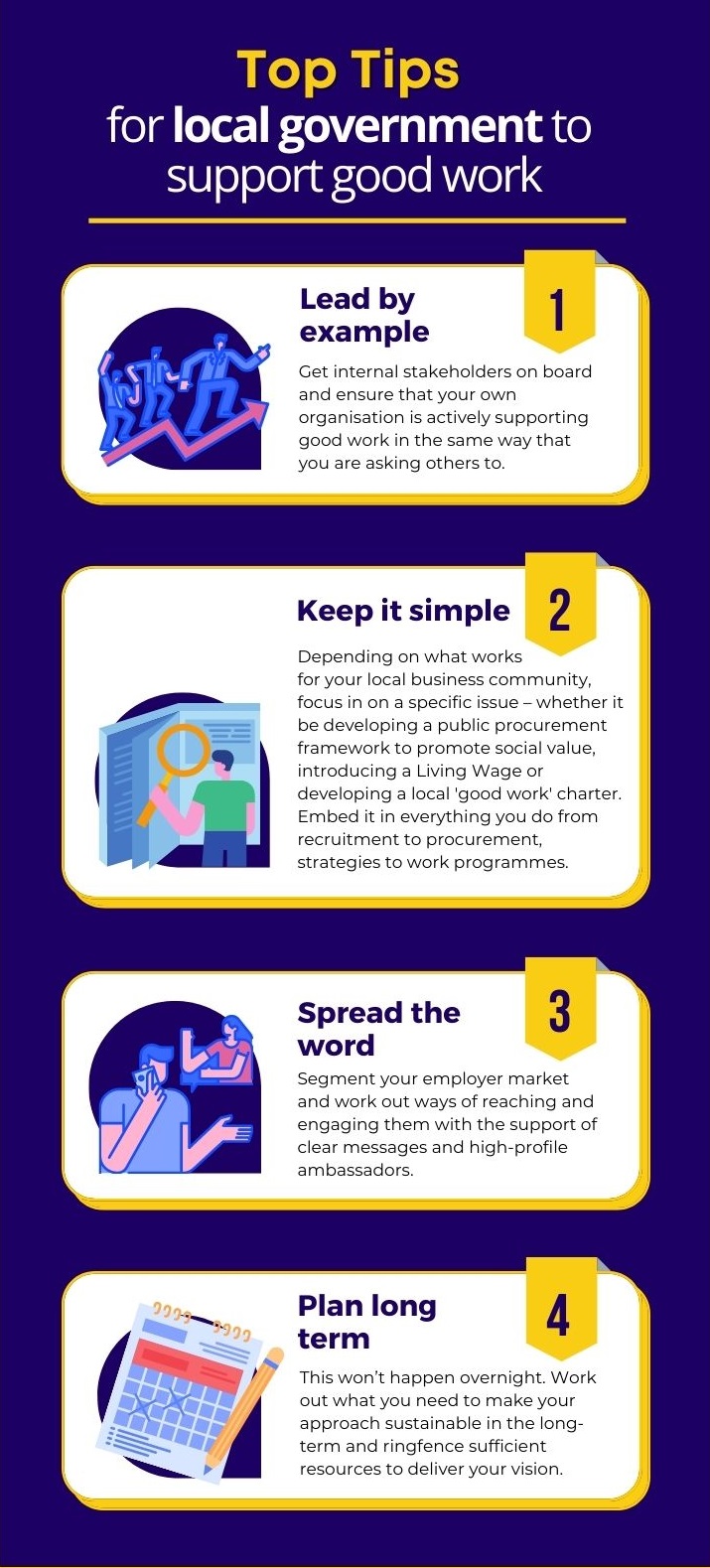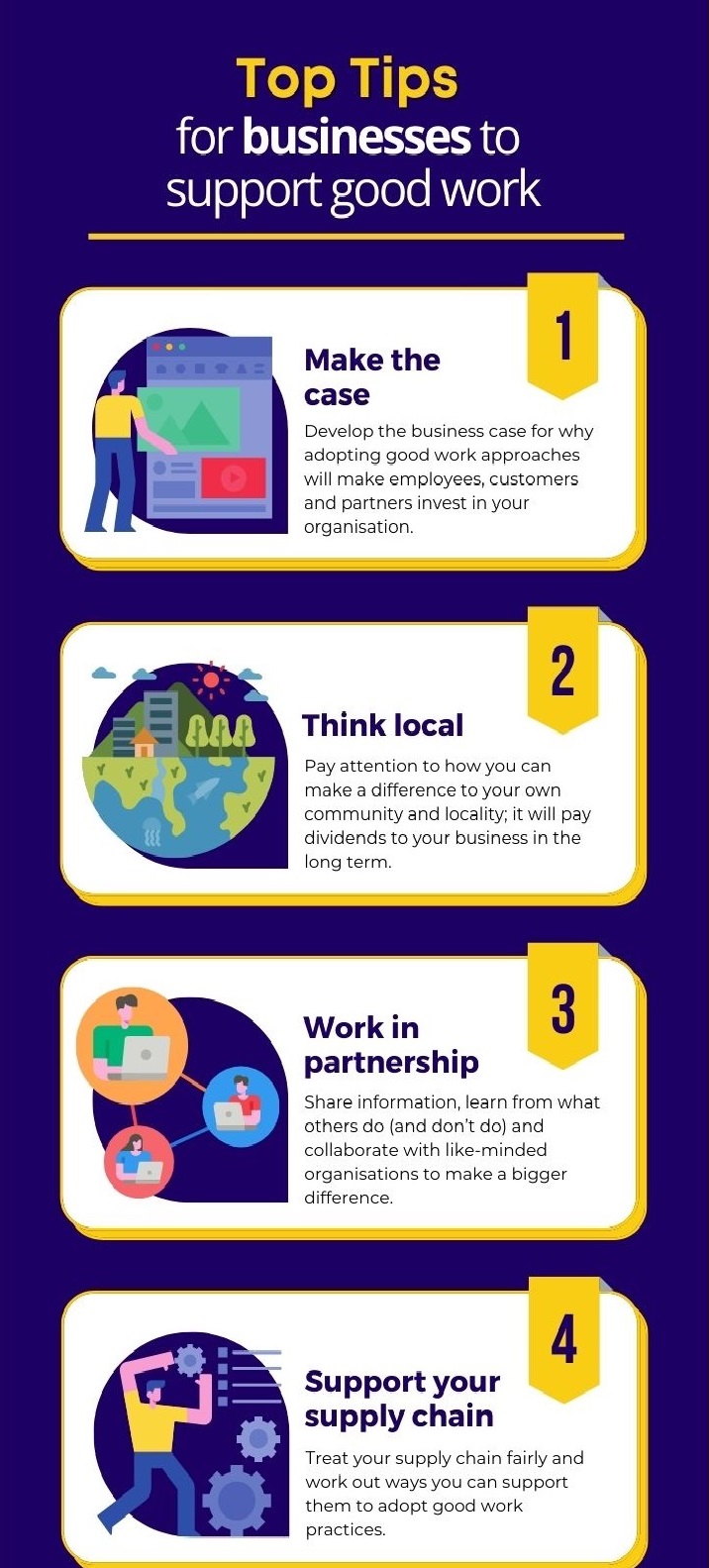Resetting the relationship between local and national government. Read our Local Government White Paper
Helping councils and combined authorities to support good work in their local area.
Introduction
For many of us, much of the time, work is just a job. But good work can be so much more than this. Work that can provide decent pay and security; where we have control, a voice and good relationships; and that gives us the opportunity to use our skills and to develop new ones, is good for people, the economy, local communities and places. It can be supportive of good health and wellbeing, raise incomes and reduce poverty, support stronger economies and better business, and help build more inclusive communities.
As we recover from the COVID-19 pandemic, and with the opportunities and challenges of technological change, net zero, Brexit and flexible working already leading to lasting changes in our economy and society, arguably delivering on good work has never been more important. So these resources set out the case for good work and how local government can take this forward – and often already does.
What is ‘good work’?
There are several frameworks which seek to define 'good work'. These commonly feature pay, working conditions, progression, work life balance and employee voice.
However there are no hard and fast rules about what constitutes 'good work', as this will often vary according to individual aspirations and needs, which can be very different and change over time. What constitutes 'good work' is also influenced by a range of social, cultural and economic factors. For example, just a few years ago working from home was not widespread, whereas now it has become part of the working pattern for millions of workers. Furthermore, while some criteria are measurable and minimum standards can be set (for example on pay), others can be more difficult to define and assess.
The reality is that 'good work' is not a destination, but a journey that employers can take through a constantly changing landscape.
What local benefits can 'good work' bring?
For local communities, the benefits of 'good work' will be obvious. Better work means higher levels of local employment, a stronger local economy and greater economic prosperity. Increasing levels of 'good work' also has the potential to greatly support improved health and wellbeing among a local population and reduce pressures on associated support services. However, it is also critically important to ensure that those who aren’t in 'good work' – either because they are in jobs with poor conditions or aren’t in employment at all – are getting access to the skills and support to move into those jobs. By doing this we can also reduce inequalities and support greater social inclusion.
Within public policy debates, a lot is said about raising aspirations of people entering the workforce. However, far less is said about raising the aspirations of the businesses that employ them. Encouraging employers to work towards ‘good work’ goals can normalise better working conditions and catalyse change in what is viewed as acceptable. For example, there are now more than eight thousand private and sector employers signed up to the Living Wage Foundation’s Real Living Wage campaign – with more than 2,500 signing up since the start of the pandemic. And many of the local charters that support 'good work' seek to normalise this further, by setting the Real Living Wage as a minimum level of pay.
Diversity and inclusion are key aspects of 'good work'. It should mean that opportunities are available for people from all backgrounds and with a range of needs, whether that is supporting people into work from socially disadvantaged backgrounds or ensuring that people with disabilities and long-term health conditions can access and retain meaningful work. Many initiatives also recognise the critical importance of providing a healthy and safe working environment and the ‘duty of care’ that employers hold towards their workers. 'Good work' should mean healthy and safe working environments and working practices that support mental wellbeing.
The pandemic, rises in the cost of living and the climate crisis are also influencing how 'good work' is perceived. Incorporating approaches that encourage employers to protect the environment and adapt to the changing needs of the workforce will not only support national and international efforts but bring local benefit.
What’s in it for employers?
'Good work' is good for employers too. Those firms that adopt approaches to support 'good work' are likely to be rewarded with higher levels of recruitment, retention and productivity among their staff. In 2008, an Institute for Employment Studies report People and the Bottom Line estimated that if organisations increased investment in a range of good workplace practices which relate to employee engagement by just 10 per cent, they would increase profits by over £1,000 per employee per year. Providing fairly paid work and adequate opportunities for development and progression can help employers to keep employees motivated in their work, build loyalty towards the organisation, provide them with the skills to progress, fill skill gaps within the business and help the organisation stay ahead of competitors.
A workforce that reflects diversity both of customers, and of the community in which the business works, is also considered to increase creativity and enable businesses to design products and services for a broader base, leading to better measures on investment and shareholder return.
Increasingly, employers are being held accountable for the quality of work that they offer and the ethics and probity of their approach. As well as supporting the recruitment and retention of workers, the offer of 'good work' is also important to consumers. Customers are increasingly conscientious about how they spend their money and want to support businesses that do the right thing. The public reaction to P&O Ferries’ decision in March 2022, to summarily dismiss 800 staff and replace them with workers earning below minimum wage, demonstrates the unwillingness of consumers to support organisations who do not treat their staff well. The reputational damage to firms that seek to undermine workplace protections and standards can be far more costly than any benefits.
How can local government support 'good work'?
Regional disparities in work, wellbeing and health outcomes, together with an increasing focus on employment, skills and economic renewal within local areas, is driving local ownership of the 'good work' agenda.
As place leaders, local government – councils and combined authorities – is becoming increasingly central in supporting the development of good practice at a local level; in understanding the interconnections of the local socio-economic, labour market, educational, and business contexts; and in leading on the development and implementation of economic and social growth policies. It is uniquely placed to support the 'good work' agenda at a local level and ensure that employment opportunities can help local economies and communities thrive.
Councils and combined authorities have a range of levers at their disposal to do this. As well as being a major employer itself and responsible for offering good quality work to thousands of public sector workers, it has extensive purchasing power and wider influence over local employers. When coupled with its insight into local economic, skills, employment, environmental and other community needs, councils and combined authorities can help support positive change.
There are several examples of ways that local government and businesses can support change, some of which are highlighted through a series of case studies and summarised in three broad themes below.
Good work charters
Good work charters (sometimes described as a pledge, standard or kite mark) establish a benchmark that local employers are encouraged to strive towards. They aim to provide a set of best practice employment practices that deliver benefits to employers, their employees and their communities.
Typically, councils and combined authorities will establish a range of criteria for defining 'good work' with local businesses, trade unions and community groups. This process will support buy-in from key stakeholders. Some charters require employers to declare that they have all aspects of the charter in place to become a signatory, sometimes defined at different levels or tiers. Others only require employers to declare that they are striving towards fulfilling the charter’s criteria. Some do both. Where criteria need to be evidenced, local government will assess and review signatories, while others will simply require employers to declare their capabilities.
Key to the success of the charter approach is sustainability and promotion, including recognition of employers who fulfil their obligations towards them. Providing promotional opportunities for businesses who support 'good work' can help to raise awareness among their customer base and increase workforce satisfaction.
Creating social value through procurement and grant giving
Councils are harnessing their financial influence to leverage 'good work', requiring that suppliers and business grant recipients sign up to charter commitments or deliver social value through their operations. Local government procurement is key to leveraging more 'good work' opportunities for residents and social value with some councils encouraging suppliers to take steps to ensure their supply chains do the same.
This may involve councils and combined authorities taking a collaborative and supportive approach, providing a framework that helps suppliers to think about the ways they support, engage and reward their employees. It can also involve setting minimum expectations for local organisations, when bidding for local government contracts or accessing grant support.
Offering local business support
To achieve local ambitions for 'good work', employers need support to maximise their growth potential and recruit locally. Encouraging businesses to make improvements to their HR practice, by taking on best practice approaches in job design, recruitment, retention and support at work, is integral to many business support approaches.
A range of government programmes, such as the Help to Grow scheme for Small and medium-sized enterprises (SMEs) and the Kickstart programme, have been designed to have a positive impact on the economic recovery following the pandemic. Local government is supplementing nationally available offers with a range of tailored support. These include support for young entrepreneurs, initiatives to encourage community access to training, employment and progression opportunities, providing local jobs hubs and encouraging employers to engage with local schools to promote opportunities in their sector.
Putting ambitions around 'good work' at the heart of local business support offers can catalyse change among participating employers.
Definitions
Living Wage: A Living Wage is a minimum pay benchmark. Examples include the National Living Wage, the Real Living Wage and other local Living Wage campaigns.
National Living Wage: The National Living Wage is set by the UK government. It is higher than the National Minimum wage and workers get it if they’re over 23.
Real Living Wage: The Real Living Wage is set by the Living Wage Foundation based on living costs. It is voluntarily paid.
Top tips
Case studies
Below are several cases studies from across the country demonstrating the ways in which local government and businesses can support 'good work' in their areas.
- County Durham – Durham County Council and Believe Housing
- Greater Manchester – Greater Manchester Combined Authority and Anchor Removals
- North of Tyne – North of Tyne Combined Authority and Explain Market
- Lambeth – Lambeth Council and Drew + Rose
Acknowledgements
The LGA commissioned the Institute for Employment Studies to undertake the research for this project.



